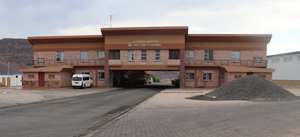
Controlled products boost economy

Kobus van Graan, Chairman of the Namibian Agronomic Board. (Photograph by Hilma Hashange)
At a recent media event, Chairman of the NAB, Kobus van Graan said that despite Namibia’s normal hostile climate for agricultural production, the NAB’s intervention has become a catalyst for impressive agronomic development in several regions. “Many years after the formation of the Agronomic Industry Act, we have the benefit to evaluate what was achieved over time. Success did not just happen. Insignificant agronomic crops grew into bumper crops and permanent economic life was brought to the industry,” said van Graan.
Defending the existence of so-called Control Boards, van Graan said “The crucial element for efficient promotion and development of a controlled product is when the NAB introduces promotion measures, which producers and processors eagerly grab in an entrepreneurial and business spirit, in order to create optimum value for themselves and their industries.”
He added that the Agronomic Board, in support of government’s desire to increase self-sufficiency, entrepreneurship and positive weather change all contribute to the success in the agronomic industry. The chairman maintains that after positive regulatory intervention by the NAB and through the concerted effort by many role-players life was created for the agronomic industry.
The first products in the country that were declared controlled products in terms of the Agronomic Industries Act, were maize and wheat. At that time, significant volumes of staple food were not produced domestically and in the interest of food security, self-sufficiency and also in the interest of agro and industrial development, these two products were declared controlled products. Based on the success experienced with maize and wheat promotion, mahangu and horticultural products also later became designated controlled products.












































